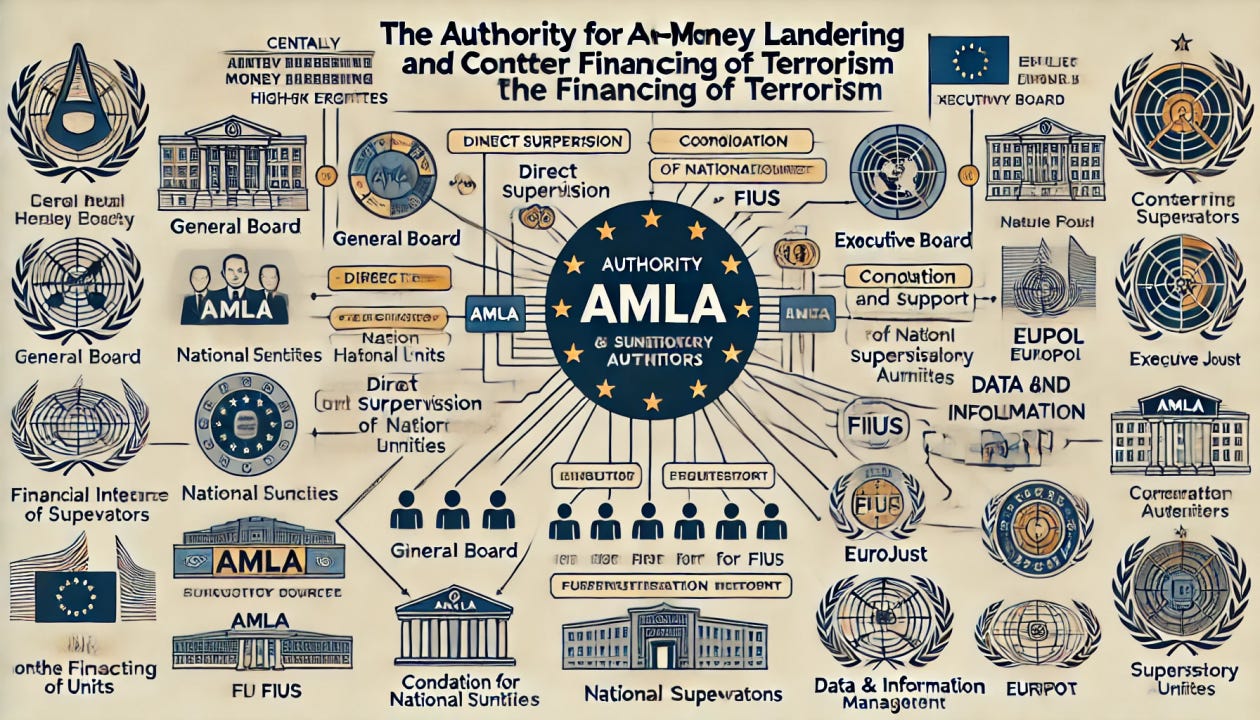What is AMLA?
The Finance-Police of the European Union (EU)
Understanding AMLA and the Risks of a Finance Police:
It is in recent years that anti-money laundering and the fight against terrorist financing, among other financial crimes, really took off. AMLA aims at enhancing transparency and enforcing regulations that ensure that financial institutions stick to set standards, stringent in nature. While the intent behind AMLA is very clear, the idea of a finance police-an empowered body with far-reaching powers to execute these regulations-has no doubt raised hairs on the back of many.
What is AMLA?
AMLA is the umbrella legal platform designed to help “combat” money laundering and financing of terrorism. It normally encompasses a package of provisions, which include:
Know Your Customer (KYC) Requirements: Financial institutions are required to verify the identities of their customers, ensuring they know who they are dealing with and can track suspicious activities.
Reporting Obligations: Institutions must report any suspicious transactions to relevant authorities. This includes transactions that seem unusually large, complex, or lack a clear economic purpose.
Record Keeping: Financial entities must maintain detailed records of transactions for a certain period, allowing for audits and investigations if necessary.
Penalties and Sanctions: AMLA imposes penalties on individuals and organisations that fail to comply with its regulations. These penalties can range from fines to imprisonment, depending on the severity of the offence.
What is the Role of a Finance Police?
Originally, AMLA was created to close certain gaps, which criminals take advantage of. This helps prevent the misuse of financial systems for criminal purposes through stringent regulations and international cooperation. The concept of a finance police involves creating a dedicated law enforcement agency tasked with monitoring, investigating, and prosecuting financial crimes, particularly those related to money laundering, including:
Access to Financial Records: The finance police would have the authority to access detailed financial records of individuals and corporations, often without needing a court order.
Freeze and Seize Assets: They could freeze bank accounts, seize assets, and halt financial transactions if they suspect illegal activity.
International Cooperation: The agency would work closely with other countries' law enforcement bodies to track down and prosecute criminals who use international financial networks.
Potential Dangers of a Finance Police:
While the establishment of a finance police might seem like a logical extension of AMLA, it carries several risks and concerns, such as:
Privacy Concerns: The major concerns are tending erosion in financial privacy. The presence of a very empowered police finance would imply that one, at any given time, has access and scrutinises the financial transactions even of people who had no ill motives, leading to a loss of trust in the financial system. A mere apprehension of being monitored at any given time for his financial activities may deter legitimate financial behaviour.
Abuse of Power: Such a level of concentration of power within a single agency will itself open the doors for abuse. In the absence of an effective system of checks and balances, it is easily conceivable that a finance police force would resort to using its powers in the pursuit of individuals or organisations out of political motivations or for personal enrichment. This might make the finance police assume an aspect more characteristic of a tool for oppression than that of a guardian of the financial order.
Overregulation: It can lead to a regulatory approach, impeding innovation in finance. The fear of being the target of the financial police could make entrepreneurs and firms reluctant to create new financial products or services, which is at the expense of the economy. Besides, tight regulation may render legal business too expensive or difficult to carry on with increasing costs and a loss of competitiveness.
Global Jurisdictional Conflicts: In this respect, financial transactions are of international scope. Hence, the finance police shall operate across borders. This may lead to potential conflicts with other nations' laws and regulations and contribute more complications to cooperation on an international basis. Besides, the idea of overreaching or violation of sovereignty by the finance police can create a political stir.
Impact on Financial Institutions: This may raise the cost of compliance for financial institutions, which are forced to cooperate with the finance police. It may translate into higher fees for customers and reduced access to financial services, particularly in regions whose regulatory frameworks are already very strict.
Balancing Enforcement with Safeguards?
While such dangers of a finance police are real, they do not cancel out the need to fight financial crime. On the other hand, a balanced approach would provide for robust safeguards against power abuse. At least this might include:
Judicial Oversight: Requiring judicial approval for actions like freezing assets or accessing financial records could help prevent abuses.
Transparency and Accountability: The finance police should operate with a high degree of transparency, with clear reporting requirements and oversight by independent bodies.
Protecting Privacy: Regulations should ensure that the privacy rights of individuals are respected and that data is used only for legitimate purposes.
Innovation: Any regulatory framework should aim to foster innovation while preventing financial crimes, ensuring that the financial system remains dynamic and competitive.
Conclusion:
In essence, AMLA is the basis for combating financial crime, but a financial police force could ultimately be an effective tool of enforcing control. The risks associated with the AMLA must be dealt with care. Safeguarding individual freedom, economic freedom and privacy is a given human right, which cannot be broken! Only by taking these aspects into account, we can ensure that efforts to combat financial crime do not lead to consequences that could undermine the very financial systems, Politicians and Authorities are trying to protect.
THERE IS NO SECOND BEST!
STAY INFORMED!


